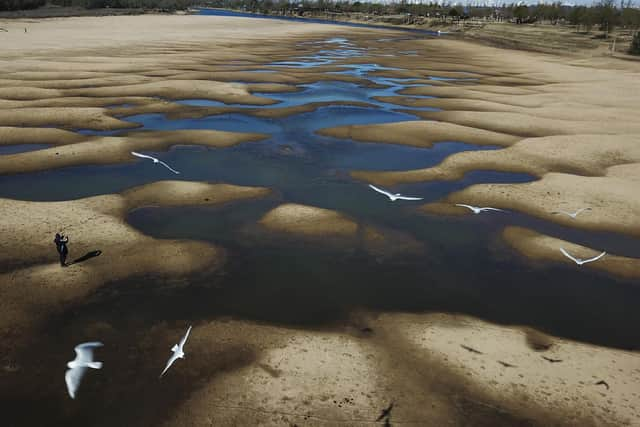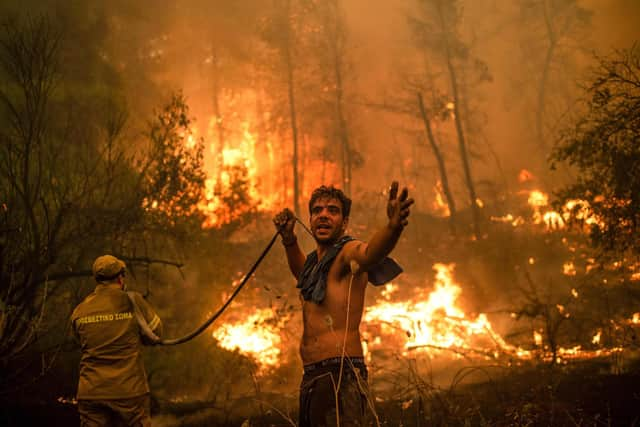COP26: Could the future of the planet hang on the summit in Glasgow?
That’s the warning in the latest report from the Intergovernmental Panel on Climate Change (IPCC), the biggest ever scientific study of its kind and the loudest alarm bell yet on the environmental and existential crisis facing the planet.
The report, Climate Change 2021: the Physical Science Basis, is the culmination of five years of work by 234 leading scientists from more than 60 countries who have worked together to rigorously evaluate climate change research papers from across the world – more than 14,000 in total.
Advertisement
Hide AdAdvertisement
Hide AdIt spells out how human activities over the past couple of centuries have driven up global temperatures at a rate “unprecedented in at least the last 2,000 years”, sparking “irreversible” alterations to the climate.


The report states: “It is unequivocal that human influence has warmed the atmosphere, ocean and land.
“Widespread and rapid changes in the atmosphere, ocean, cryosphere and biosphere have occurred.”
The past five years have been the hottest ever recorded on earth, with current measurements showing a 1.1C rise since pre-industrial times.
The report predicts temperatures will continue to rise until the middle of this century, no matter what actions might be taken.


It warns the 1.5C threshold set out in the Paris Agreement is likely to be exceeded within the next 20 years, and 2C – the internationally agreed ‘danger’ point – reached before the century is out.
What’s more, every region across the world is being affected, with evidence of increased extremes such as heatwaves, heavy rainfall, droughts and tropical cyclones.
Melting ice sheets and recent events such as the record-breaking heatwave in north-western America, disastrous flooding in Germany and other parts of Europe and deadly wildfires currently raging in Greece and Turkey serve as stark proof of these findings.
Advertisement
Hide AdAdvertisement
Hide AdAnd impacts such as these are destined to get more severe as the world gets warmer.
The report says many of the changes happening, such as rising sea level, are “irreversible for centuries to millennia” and so are locked in for some time to come.
Dr Michael Byrne, lecturer from the School of Earth and Environmental Sciences at the University of St Andrews, was a contributing author on the report.
“It is impossible to overstate the importance of this report,” he said.
“It presents the latest physical understanding of the climate system and climate change, combining evidence from past climates, instrumental observations, process understanding and computer simulations.
“It shows how and why climate has changed, and the improved understanding of human influence on a wide range of climate phenomena, including extreme weather events.
“This new report presents yet more irrefutable evidence that human activities – primarily CO2 emissions – are changing the climate in unprecedented and dangerous ways.”
But it’s not all doom and gloom. The publication does offer a glimmer of hope.
Advertisement
Hide AdAdvertisement
Hide AdAlthough man is charged with the current perilous state of the planet, the authors agree that “immediate, rapid and large-scale” reductions in greenhouse gas emissions could restrict warming sufficiently to stabilise the climate – although it could take a couple of decades for the effects to be discernible.
They say releases of carbon dioxide need to be slashed to at least net zero, with concerted efforts to simultaneously cut methane and other warming gases.
The findings cannot be dismissed as scaremongering as most of the information is already public knowledge.
The report comes with less than 90 days to go until the United Nations climate summit COP26 comes to Glasgow, hosted by the UK in partnership with Italy.
The meeting is the most important since COP21 in 2015, when the landmark Paris Agreement was created.
Almost all of the world’s nations have signed up to the treaty, with the goal of limiting global warming to well below 2C, preferably no more than 1.5C, compared to pre-industrial levels.
Measures to achieve this include ending fossil fuels consumption, switching to renewable energy, restoring and creating natural carbon sinks such as peatlands and forests, and cutting emissions from agriculture and domestic heating.
Professor Tim Palmer, Royal Society research professor in climate physics at the University of Oxford, has warned that failure to cut emissions could see the future climate become “some kind of hell on earth”.
So what needs to happen now?
Advertisement
Hide AdAdvertisement
Hide AdThe Glasgow gathering, which was delayed from 2020 due to the coronavirus pandemic, will be pivotal in what happens next and whether the world can work together to save the planet.
It’s when the 196 Paris signatories must set out “ambitious” targets to cut greenhouse gases by 2030 and how they aim to achieve net-zero carbon emissions by 2050.
Phasing out of coal-burning will be high up the agenda, although earlier talks suggest this will be a difficult battle to win.
Another important debate will centre on financing to enable poorer countries which are disproportionately affected by climate change to adapt and survive. Pledges amounting to $100 billion [£72bn] of funding have already been set out, but so far only a small proportion of that has been forthcoming.
The establishment of an international carbon trading scheme that will allow emitters to compensate through climate-positive actions such as tree planting will also be under discussion.
Scotland has a legally binding goal to reach net zero by 2045, five years ahead of the UK’s target.
The Scottish Government last month announced indicative nationally determined contributions for Scotland, despite having no obligation to do so as part of the UK.
Scotland’s net zero secretary Michael Matheson said the IPCC’s report shows “the very real threat and heightened risk the climate emergency poses to the planet”.
Advertisement
Hide AdAdvertisement
Hide AdHe said: “We will not get many more warnings before time runs out.
“COP26 in Glasgow represents the world’s best chance – perhaps one of our last chances – to avert the worst impacts of climate change.”
A message from the Editor:
Thank you for reading this article. We’re more reliant on your support than ever as the shift in consumer habits brought about by coronavirus impacts our advertisers.
If you haven’t already, please consider supporting our trusted, fact-checked journalism by taking out a digital subscription.
Comments
Want to join the conversation? Please or to comment on this article.
